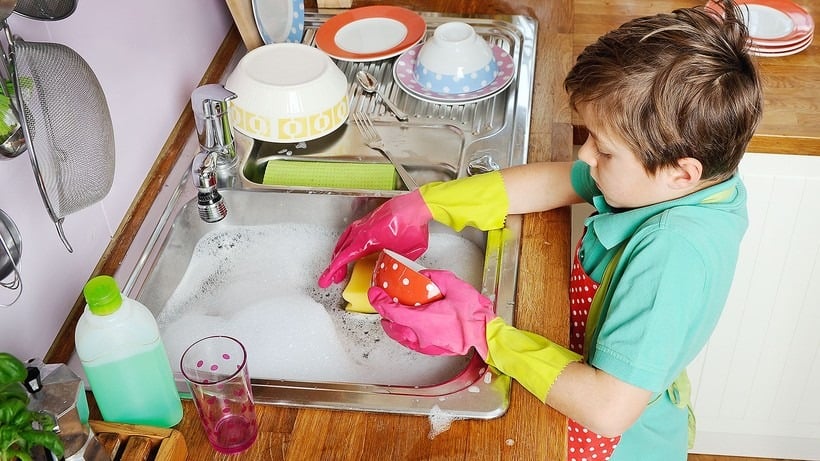GĐXH - Children who are 'trained' by their parents to do this from a young age will have higher incomes than other children.
Accordingly, Harvard University conducted a 75-year study called GrantStudy, surveying 268 students studying at Harvard.
Combined with the research of 1,500 students by Stanford University professor Lewis Terman and the research on juvenile crime by famous American criminologist Sheldon Glueck, they summarized and drew some very special conclusions.
One of the conclusions that surprised many parents was:
"Children who have the habit of doing housework from a young age will have a 20% higher income in the future than lazy children who do not do housework. Besides, the crime rate between children who regularly do housework and children who do not do housework is 1:10. The married life and later quality of life of children who know how to do housework are also much happier and are more likely to achieve success in the future."

Julie Lythcott-Haims, author of the book: How To Raise An Adult, emphasized that the change from a diligent child to a successful person later on all started from doing housework. Illustration photo
In a TED Talks talk, Julie Lythcott-Haims, author of the book: How To Raise An Adult, and a former student of Stanford University, emphasized that the change from a diligent child to a successful adult all started with doing housework.
"If your child doesn't do chores today, don't be surprised if they have trouble getting along with coworkers later," says Lythcott-Haims.
When a child is taught by his parents to do housework, he will become a person who knows how to cooperate with his colleagues in the future. When faced with difficulties, he will know how to solve problems and tend to complete things independently.
"By making children do chores like taking out the trash or folding clothes, they will realize that they need to work to be a part of life," Lythcott-Haims shares.
Lythcott-Haims also shared that she raised her two children as if they were fragile bonsai trees. When she wanted to prune them, she always made sure not to affect the beauty of the tree.
But over time, she realized that children are not ornamental plants, they are very vulnerable.
Children are like wildflowers and she will raise them in a way that they can grow and flourish on their own without her being there.
Benefits of parents encouraging children to do housework from a young age
Developing life skills
Children can help around the house in many different ways, from walking pets to cooking dinner.
Taking on responsibilities helps children understand their value in the family.
Additionally, children benefit from tasks in a variety of ways, including feeling appreciated, recognizing the needs of others, and feeling more connected to their parents.
A study has found that children who participate in chores from a young age are more likely to have strong relationships with friends, family, and academic achievement than other children.

Taking responsibility helps children understand their value in the family. Illustration photo
Time management
When parents see their children busy with school, sports activities, clubs, part-time jobs and social life, they often think they won't have time for housework.
But, learning how to handle the combined responsibilities of work and fun is essential to successful time management.
If tasks are not negotiable, children will find ways to fit them into their busy schedules.
Try the popular strategy known as "Grandma's Rule."
This rule conveys the message, "No dessert until you finish your dinner," which can be applied to household chores to teach children the value of satisfaction in completing a task.
Teamwork
Whether your kids are washing the car or scrubbing the bathroom together, they'll learn valuable lessons about getting along with family members.
Involving children in household chores will definitely help teach them the value of teamwork.
Social skills
Chores become more fun when shared with others. Children learn to communicate and negotiate with their “co-workers” when performing the same task.
For example, children can learn to communicate with each other when they clean the house together or when they work on a project together.
Autonomy
Self-control is strengthened when a child is forced to work patiently until a task is completed.
This teaches children to practice impulse control, helping them resist temptation later on.
When you require your child to complete one task before moving on to the next, they are more likely to value the things they have to wait for.
Good working habits
When children learn to complete household chores, they develop good work habits.
Many household chores require attention to detail, which is why your child will develop a work ethic that will help them succeed in their future careers.
Budgeting
When children receive an allowance for chores, they can learn to save and budget for things they want to buy.
If a chore-based allowance isn't part of your upbringing , you can teach your child about money through fun tasks like taking them grocery shopping to compare prices.
Responsibility
When children and teens take on chores, they can learn the importance of responsibility.
In general, housework is not a boring task, nor is it just a useless pastime.
There are more benefits to doing chores than you might think. Helping your parents with chores will help your children when they start taking care of their own home.
It is also the best habit a child can acquire in life.
 10 things smart parents won't forbid their children
10 things smart parents won't forbid their childrenSource: https://giadinh.suckhoedoisong.vn/dai-hoc-harvard-nhung-dua-tre-luc-be-khong-duoc-cha-me-cho-lam-viec-nay-muc-luong-tuong-lai-se-thap-hon-20-172250217161624492.htm



![[Photo] Solemn opening of the 1st Government Party Congress](https://vphoto.vietnam.vn/thumb/1200x675/vietnam/resource/IMAGE/2025/10/13/1760337945186_ndo_br_img-0787-jpg.webp)

































































































Comment (0)